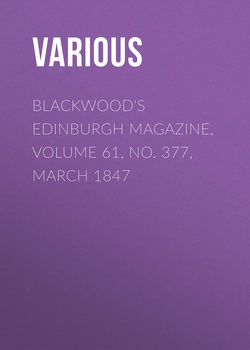Blackwood's Edinburgh Magazine, Volume 61, No. 377, March 1847

Реклама. ООО «ЛитРес», ИНН: 7719571260.
Оглавление
Various. Blackwood's Edinburgh Magazine, Volume 61, No. 377, March 1847
ON PAUPERISM, AND ITS TREATMENT
THE POACHER;
I. – THE DEER-RIDER
II. – ANSBJERG
III. – THE NISSE.12
IV. – THE ELOPEMENT
A RIDE TO MAGNESIA
JAVA.18
THE CAVE OF THE REGICIDES;
LATEST FROM THE PENINSULA.46
TO THE STETHOSCOPE
LETTERS ON THE TRUTHS CONTAINED IN POPULAR SUPERSTITIONS
HORÆ CATULLIANE
Отрывок из книги
The Danish isles have such a pleasant, friendly, peaceful aspect, that, when carried by our imagination back to their origin, the idea of any violent shock of nature never enters into our thoughts. They seem neither to have been cast up by an earthquake, nor to have been formed by a flood, but rather to have gradually appeared from amid the subsiding ocean. Their plains are level and extensive, their hills few, small, and gently rounded. No steep precipices, no deep hollows remind one of the throes at Nature’s birth; the woods do not hang in savage grandeur on cloud-capt ridges, but stretch themselves, like living fences, around the fruitful fields. The brooks do not rush down in foaming cataracts, through deep and dark clefts, but glide, still and clear, among sedge and underwood. When, from the delightful Fyen, we pass over to Jutland, we seem, at first, only to have crossed a river, and can hardly be convinced that we are on the continent, so closely resembling and near akin with the islands is the aspect of the peninsula. But the further we penetrate, the greater is the change in the appearance of the country. The valleys are deeper, the hills steeper; the woods appear older and more decayed; many a rush-grown marsh, many a spot of earth covered with stunted heath, huge stones on the ridgy lands – every thing, in short, bears testimony to inferior culture, and scantier population. Narrow roads with deep wheel-ruts, and a high rising in the middle, indicate less traffic and intercourse among the inhabitants, whose dwellings towards the west appear more and more miserable, lower and lower, as if they crouched before the west wind’s violent assault. In proportion as the heaths appear more frequent and more extensive, the churches and villages are fewer and farther from each other. In the farm-yards, instead of wood, are to be seen stacks of turf; and instead of neat gardens, we find only kale-yards. Vast heath-covered marshes, neglected and turned to no account, tell us in intelligible language that there is a superabundance of them.
No boundaries, no rows of willows, mark the division of one man’s land from another’s. It appears as if all were still held in common. If, at length, we approach the hilly range of Jutland, vast flat heaths lie spread before us, at first literally strewn with barrows of the dead; but the number of which gradually decreases, so that it may reasonably be supposed that this tract had never, in former times, been cultivated. This high ridge of land, it is thought, and not improbably, was the part of the peninsula that first made its appearance, rising from the ocean and casting it on either side, where the waves, rolling down, washed up the hills and hollowed out the valleys. On the east side of this heath, appear, here, and there, some patches of stunted oaks, which may serve a compass to travellers, the tops of the trees being all bent towards the east. On the large heath-covered hills but little verdure is to be seen, – a solitary grass-plot, or a young asp, of which one asks, with surprise, how it came here? If a brook or river runs through the heath, no meadow, no bush indicates its presence: deep down between hollowed-out hills, it winds its lonely course, and with a speed as if it were hurrying out of the desert.
.....
The keeper, whose tongue had hitherto been bound by a power like magic, now gave vent to his long-repressed indignation, in a volley of oaths and curses.
The traveller, whose sympathy had transferred itself from the escaped deer-stealer to the almost despairing game-keeper, endeavoured to comfort him as far as lay in his power. “You have in reality lost nothing,” said he, “except the miserable satisfaction of rendering a man and all his family unhappy.”
.....